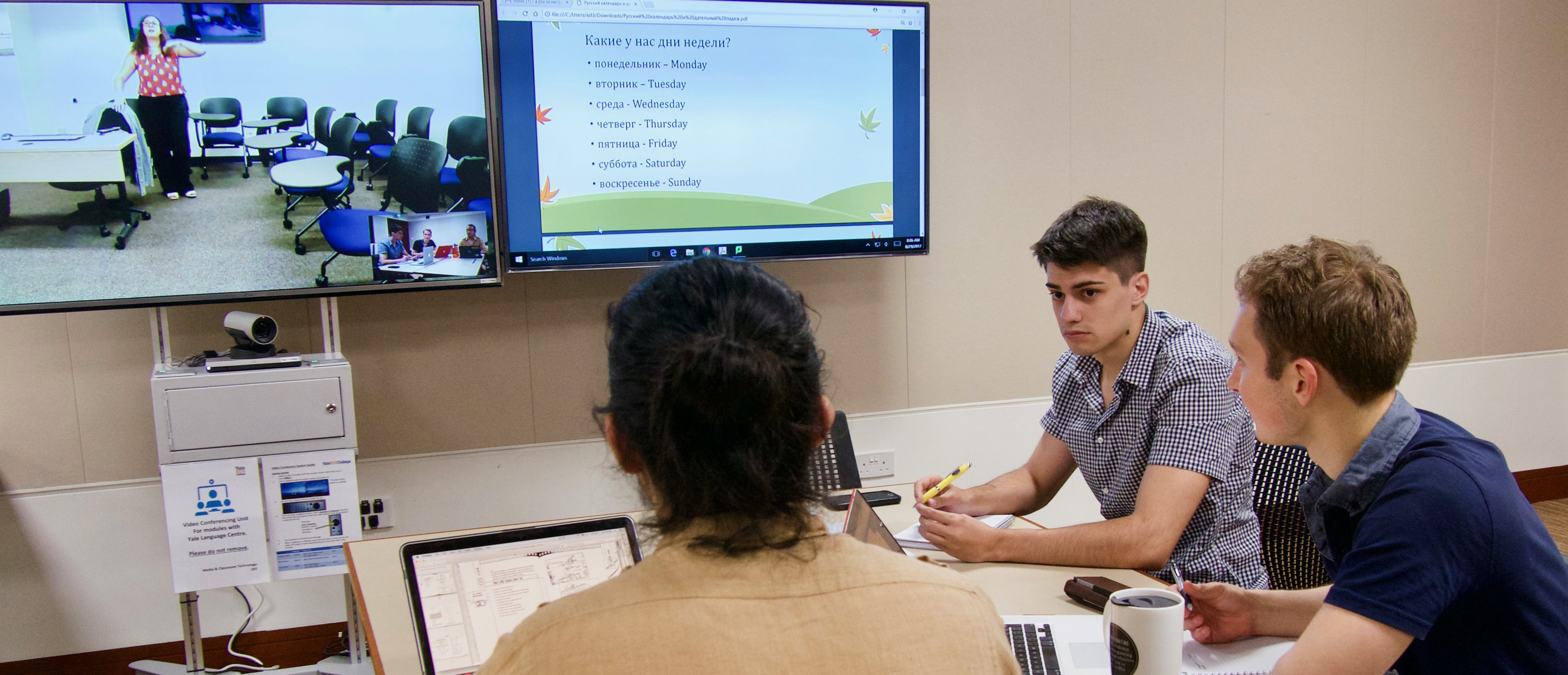Yale-NUS students learn diverse languages through teleconference

In an increasingly globalised world, the mastery of different languages is becoming essential to students who hope to embark on careers that span countries and continents.
At Yale-NUS College, students are offered the opportunity to learn diverse languages such as Italian, Portuguese, Russian, and Sanskrit via the Yale Center for Language Study.
According to Senior Lecturer of Spanish and Associate Director of Language Studies Eduardo Lage-Otero, students have indicated significant interest in these languages. To enable the students to pursue these opportunities, the College worked with Yale to develop language programmes conducted via teleconference. These new classes augment the current range of language programmes that are already being offered at the College, in partnership with the National University of Singapore’s (NUS) Centre for Language Studies.
“Although this programme is still in pilot mode, I consider it a great way to increase the opportunities available to our students to learn a new language while strengthening our links to Yale,” Dr Lage-Otero shared.
Martin Vasev (Class of 2018) was one of four students who took a beginner class in Russian last semester. Besides Russian, Martin speaks Bulgarian, which is his mother tongue with Spanish as his second language, as well as English and Chinese.
Martin had made a promise to himself to take a language class every semester and he decided to take up Russian after completing Chinese up to the Upper Intermediate level.
“When looking through the classes, Russian immediately attracted my attention. It is widely spoken in Bulgaria, where Russian literature and culture have strong influences. While growing up, my mother would play me songs and movies in Russian. When making the choices for the semester, I thought that it was time to finally ‘yield to the pressure’ and begin learning Russian,” he shared.
While Martin had reservations about taking a class conducted over teleconference, the experience was so fulfilling he decided to continue taking it in his senior year.
“Initially, I thought it would be very difficult to conduct the classes, with the professor on the other side of the world, many time zones away. Fortunately, my experience was excellent. The professor was always available for questions and discussions, and the advanced technology in the classroom made it feel as if we were in the same room,” he noted.
“The class itself was extremely enjoyable and rewarding. The atmosphere was very relaxed and friendly, and the pace was right. At the end of the semester, we covered so much material that we were able to write essays in Russian and listen to Russian news.”
To help him grasp the language, Martin also received weekly peer tutoring from Anna Evtushenko (Class of 2017), who hails from Novosibirsk, Russia, which he found to have been tremendously helpful.
For the module’s final project, Martin worked with his classmates to develop a brochure about Yale-NUS College in Russian.
“We covered topics such as academics, residential living, professional experience, and daily life. It was really the culmination of a semester-long effort – from doing research on the topic in Russian, to writing the text and piecing the design together. Instead of spending hours and hours revising grammar points, we applied the same knowledge for a practical outcome,” Martin explained.
According to Dr Lage-Otero, languages are a key component of a liberal arts education.
“Learning another language is an integral part of a liberal arts education. Many students study a language as part of their majors in Anthropology, Global Affairs or Literature for instance. Some have learnt a new language to conduct research for their capstone projects in History and Philosophy, while others study a language as part of their personal development and to complement their goals in their major,” he noted.
Other languages offered at Yale-NUS College include Latin, Ancient Greek and Spanish. Students can also learn French, Japanese and Thai at the NUS Centre for Language Studies which offers 13 language programmes.
Carmen Denia (Class of 2017) studied Latin and Ancient Greek over the course of her college career and took a teleconference class in Italian in her senior year.
Carmen’s interest in Italian developed when she spent a summer in Rome in her penultimate summer.
“What really got me interested in Italian was living in Rome for part of the summer last year through a Yale Summer Study programme. When the opportunity presented itself to learn Italian formally here at Yale-NUS, I realised that I had fallen in love with the language so it only seemed right to take the course. I want to be able to go back to Rome and find my friends, bring them presents, and fully understand everything they’re saying this time!”
Academically, Italian also helped Carmen with her pursuits as a literature major.
“I have been working on Dante’s Divine Comedy in different classes in the last two years of college, and I eventually wrote about Purgatorio for my capstone. Being able to read this poem one day in the original is definitely a pull,” she reflected.
On her experience taking a class over teleconference, Carmen’s favourite moment came from the final lesson.
“The instructor helped us read the start and end of Dante’s La Vita Nuova. With a lot of his help, we could make out some of the sentences, and I was very happy that we could do that after just a semester on the language,” she said.
Having recently graduated, Carmen is headed to Yale Divinity School and hopes to either work for the Catholic Church or become a religious teacher.
“I intend to take classes in Italian while I’m at Yale so that I can dig deeper into Dante’s work and mediaeval Italy as a whole,” shared Carmen.





